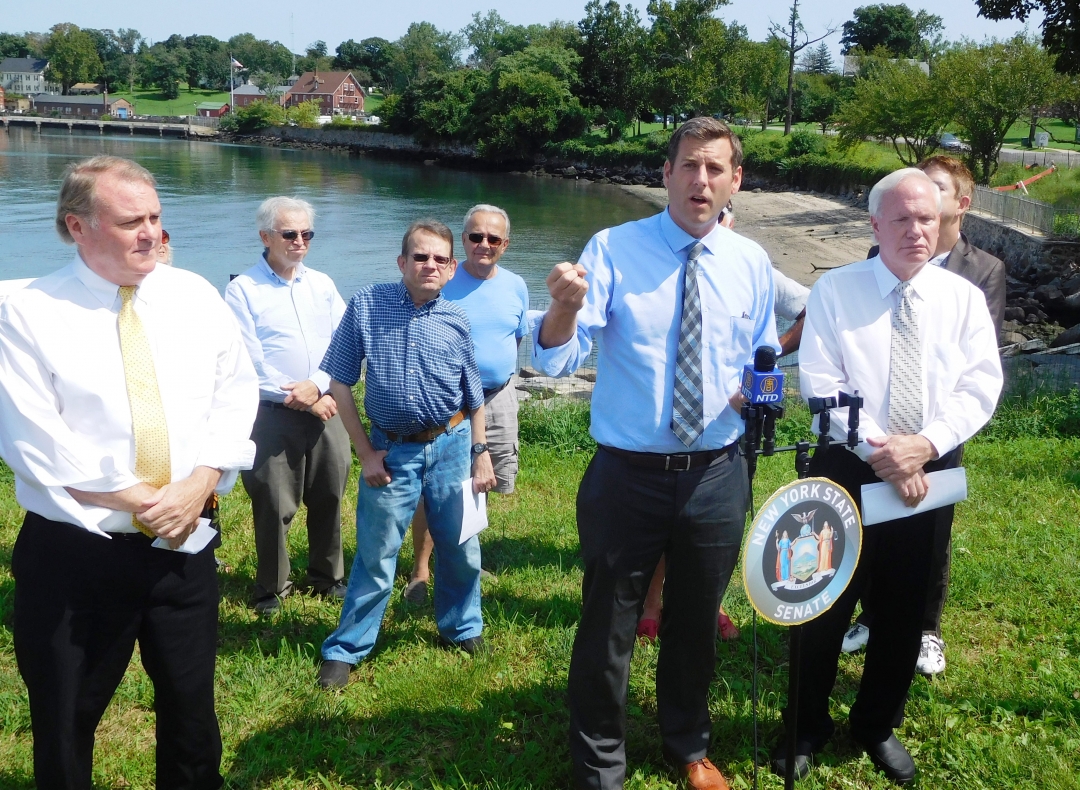Assemblyman Braunstein and Senator Avella Announce Columbia University Study on How New Flight Patterns Affect Human Health
Assemblyman Braunstein & Senator Tony Avella stood with Dr. Peter Muenning from Columbia University’s Mailman School of Public Health to discuss Columbia’s recent study, “The Trade-Off between Optimizing Flight Patterns and Human Health.” Also in attendance were representatives from Congressman Suozzi’s office, Congresswoman Meng’s office, and members of the community.
In the summer of 2012, residents of Northeast Queens started to notice a huge increase in the noise from aircraft over their heads, much more than they had ever experienced. Upon investigating, Assemblyman Braunstein and Senator Avella found out that the FAA had begun to use a new type of flight pattern without notice to residents. Fast forward six years and the residents of this community continue to suffer the extreme noise impacts from this and other new flight patterns and procedures - procedures the FAA says will continue to be rolled out in the months and years to come.
Assemblyman Braunstein and Senator Avella always believed there were very likely to be negative health impacts from this onslaught of concentrated airplane noise over these communities, and now this study helps confirm those beliefs.
“I want to thank Columbia University and Professor Muenning for conducting this very important study. I also to want to thank Queens Quiet Skies and Janet McEneaney for their tireless work bringing attention to the problem of noise pollution in Northeast Queens,” said Assemblyman Braunstein. “This study confirms what we have believed all along, that year-round use of the TNNIS climb has a detrimental impact on the health of residents who live within its path. The study also shows that the economic benefits generated through the use of this new NextGen departure procedure are not as significant as we have been led to believe and do not outweigh the costs associated with the negative health effects it has created. I remain committed to working with Senator Avella and Representatives Meng and Suozzi to obtain resources to expand the scope of this study and will keep fighting to reduce the unfair burden of airplane noise that has been forced upon our community,” continued Assemblyman Braunstein.
“Not only have residents been bombarded with noise for years, this study confirms that their health may have been impacted, too,” said Senator Avella. “With completion of this study, we can begin to see what the actual public health effects are due to these flight patterns. In fact, the study shows that people could lose up to one year out of their lifespan due to these negative effects. This is shocking and requires further study to reveal any additional impacts on human life. That is why, in conjunction with Assemblyman Braunstein, I am committing to obtaining additional state funding for the Mailman School of Public Health to expand this study,” continued Senator Avella.
“The FAA places a very high value on lives inside airplanes, but places a low value on those inside their homes,” said Dr. Peter Muenning, Professor, Mailman School of Public Health. “Reducing airplane noise would prevent more deaths than screening for breast or colon cancer, and it would do so at a lower cost.”
“The results of this study confirm that excessive aircraft noise over Queens negatively impacts the health of borough residents,” said U.S. Rep. Grace Meng. “I join my colleagues in seeking an expanded study, and legislation I am sponsoring, the Airplane Noise Research and Mitigation Act of 2018, would help increase noise-related studies by FAA Centers for Excellence. We must do all we can to combat the excessive airplane noise that continues to take a toll on the health and quality of life of Queens residents.”
Janet McEneaney, President of Queens Quiet Skies, said, “It seems that even ‘economic engines’ come with a cost. The cost of reckless aviation expansion in our metro New York area is too high, as the study demonstrates. The health of millions of New Yorkers has been endangered.”
Janet McEneaney, President of Queens Quiet Skies, said, “It seems that even ‘economic engines’ come with a cost. The cost of reckless aviation expansion in our metro New York area is too high, as the study demonstrates. The health of millions of New Yorkers has been endangered.”

